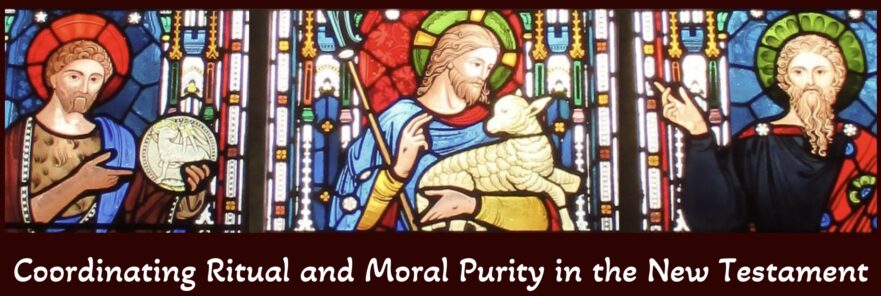How to cite this article: Joshua N. Tilton, “Coordinating Ritual and Moral Purity in the New Testament,” Jerusalem Perspective (2025) [https://www.jerusalemperspective.com/30047/].
Updated: 4 April 2025
| Rather listen instead? |
| JP members can click the link below for an audio version of this essay.[*]
Paid Content
Premium Members and Friends of JP must be signed in to view this content. If you are not a Premium Member or Friend, please consider registering. Prices start at $5/month if paid annually, with other options for monthly and quarterly and more: Sign Up For Premium  |
In his book, Impurity and Sin in Ancient Judaism,[41] Jonathan Klawans argued that it was disagreements over moral purity that played as great a role in distinguishing the Second Temple Jewish sects (Pharisees, Sadducees, Essenes, etc.) from one another as disagreements over ritual purity.[42] Although disagreements regarding ritual purity were undeniably divisive, the issue of moral purity and how it should (or should not) be coordinated with ritual purity determined how each sect related to its members and to the Jewish people as a whole. An extreme view that merged ritual and moral purity required separation from broader “sinful” Jewish society, while a more moderate view that separated ritual and moral purity allowed for full participation in broader Jewish society. At the end of his book Klawans analyzed three New Testament figures—John the Baptist, Jesus, and Paul—with respect to how they coordinated the concepts of ritual and moral purity, with a view to better understanding how these figures fit in with or stood apart from the other ancient Jewish sects.
In this essay we will attempt to refine Klawans’ analysis of these New Testament figures by introducing a small but consequential distinction regarding the communicability of moral impurity, which he seems to have left out of the discussion. We will also take each figure’s audience into the equation, because the audience each figure addressed determines what they said about the issues of ritual and moral purity every bit as much as their opinions regarding how the two concepts should be correlated. By taking these factors into account we may be better equipped to understand how John the Baptist, Jesus, and Paul coordinated the concepts of ritual and moral purity.
Premium Members and Friends of JP must be signed in to view this content.
If you are not a Premium Member or Friend, please consider registering. Prices start at $5/month if paid annually, with other options for monthly and quarterly and more: Sign Up For Premium

- [1] Indeed, a third type of purity also appears in the Hebrew Scriptures, that of animals which are pure for consumption, but we will leave this third type of purity aside in the present discussion. ↩
- [2] Not all scholars agree as to the best terminology to describe these two systems of purity or even that these two systems of purity were entirely distinct. Kazen preferred to speak about “inner” and “outer” purity in place of “moral” and “ritual” purity, and argued that “outer” purity is not without moral components. See Thomas Kazen, Jesus and Purity Halakhah: Was Jesus Indifferent to Impurity? (rev. ed.; Winona Lake, Ind.: Eisenbrauns, 2010), 219-222. In this essay we will adopt Klawans’ categories since it is Klawans’ analysis we are considering. ↩
- [3] For an introduction to ritual purity, see Joshua N. Tilton, “A Goy’s Guide to Ritual Purity,” Jerusalem Perspective (2014) [https://www.jerusalemperspective.com/12102/]. ↩
- [4] Cf. m. Kel. 12:7. ↩
- [5] The Talmud attributes to Jesus the opinion that hire of a prostitute may be used to build a latrine (b. Avod. Zar. 17a). On this saying and the contexts in which it appears, see Joshua Schwartz and Peter J. Tomson, “When Rabbi Eliezer Was Arrested For Heresy,” Jewish Studies, an Internet Journal 10 (2012): 145-181. ↩
- [6] See Klawans, Impurity and Sin in Ancient Judaism, 64-66. ↩
- [7] Ibid., 92-117. ↩
- [8] Ibid., 67-91. ↩
- [9] Ibid., 90. ↩
- [10] Cf. Kazen, Jesus and Purity Halakhah, 233. ↩
- [11] See David N. Bivin and Joshua N. Tilton, “A Voice Crying,” The Life of Yeshua: A Suggested Reconstruction (Jerusalem Perspective, 2020) [https://www.jerusalemperspective.com/19636/], Comment to L35. ↩
- [12] Klawans, Impurity and Sin in Ancient Judaism, 139. ↩
- [13] Ibid., 140. ↩
- [14] Ibid. ↩
- [15] Ibid. ↩
- [16] Ibid., 141. ↩
- [17] We see no reason to deny that John’s immersion was also capable of removing normal ritual impurities. ↩
- [18] For a similar view, see R. Steven Notley, “John’s Baptism of Repentance,” Jerusalem Perspective (2004) [https://www.jerusalemperspective.com/6137/]. Notley, however, assumed that Josephus’ characterization of John’s baptism is basically correct. John’s immersion purifies outwardly, while the Holy Spirit purifies inwardly on account of repentance. We, by contrast, suppose that John agreed with the Essenes that sin ritually defiled the body outwardly and defiled the spirit inwardly. For John, the body and the spirit had to be purified from sin. ↩
- [19] See Klawans, Impurity and Sin in Ancient Judaism, 141. ↩
- [20] Ibid., 142. ↩
- [21] Ibid., 143. ↩
- [22] Ibid., 142. The sources do not state that John’s immersion was a one-time deal, but the necessity of having John the Baptist administer the immersion and the impracticality of frequent excursions to the desert to meet John lead to this conclusion. See Kazen, Jesus and Purity Halakhah, 236. Cf. Klawans, Impurity and Sin in Ancient Judaism, 139, 209 n. 24. ↩
- [23] We do not know what it was about John’s immersion that made it uniquely able to wash out the stain of sin. Did the Baptist believe that the Spirit of God hovered over the waters in which he immersed the repentant sinners? Cf. 1QS III, 7. ↩
- [24] Klawans, Impurity and Sin in Ancient Judaism, 140-141. ↩
- [25] However, we would not say with Kazen (Jesus and Purity Halakhah, 239) that John’s ritual immersion “concerned inner impurity only.” John’s immersion was more, but not less, than an ordinary immersion. The recipients emerging from John’s immersion would have been both ritually and morally pure in body and spirit, inwardly and outwardly. ↩
- [26] Klawans, Impurity and Sin in Ancient Judaism, 147. ↩
- [27] Ibid., 148. ↩
- [28] Ibid., 149. ↩
- [29] Ibid., 149. ↩
- [30] Ibid. ↩
- [31] Ibid. ↩
- [32] On purity implications of the centurion’s slave story, see JP Staff Writer, “Two Neglected Aspects of the Centurion’s Slave Pericope,” Jerusalem Perspective (2024) [https://www.jerusalemperspective.com/28673/], esp. under the subheading “The Centurion’s Moral Worthiness and his Ritual Status.” ↩
- [33] See JP Staff Writer, “What’s Wrong with Contagious Purity? Debunking the Myth that Jesus Never Became Ritually Impure,” Jerusalem Perspective (2024) [https://www.jerusalemperspective.com/29371/], esp. under the subheading “Did Jesus Not Care About Defilement?” ↩
- [34] Klawans, Impurity and Sin in Ancient Judaism, 151. ↩
- [35] Ibid., 152. ↩
- [36] Ibid., 154. ↩
- [37] Ibid. ↩
- [38] Ibid., 156. ↩
- [39] See Peter J. Tomson, “‘Devotional Purity’ and Other Ancient Jewish Purity Systems,” in his Studies on Jews and Christians in the First and Second Centuries (Tübingen: Mohr Siebeck, 2019), 107-139, esp. 133. ↩
- [40] For further discussion of this topic, see Paula Fredriksen, “Judaizing the Nations: The Ritual Demands of Paul’s Gospel,” in Paul’s Jewish Matrix (ed. Thomas G. Casey and Justin Taylor; Rome: Gregorian & Biblical Press, 2011), 327-354. ↩
- [41] Jonathan Klawans, Impurity and Sin in Ancient Judaism (Oxford: Oxford University Press, 2000). ↩
- [42] Ibid., viii. ↩




